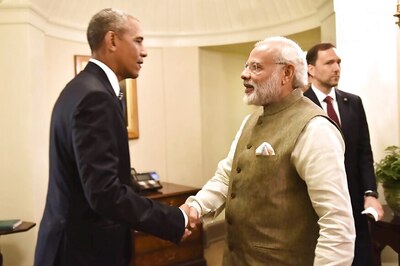
views
Redmond, Washington: Microsoft Corporation Chairman Bill Gates, long the geeky face of the world's largest software company, is giving up day-to-day responsibilities of the company he co-founded.
The move will pave the way for others, including CEO Steve Ballmer and technology luminary Ray Ozzie, to determine the future of a company that grew from making simple software for kit computers to dominating personal computing with its Windows operating system and Office business software.
Gates, 50, said on Thursday he will remain the company's chairman after transferring his daily responsibilities over a two-year period.
Speaking at Microsoft's Redmond campus, Gates said he was stepping away from “one of the best jobs in the world” to focus on something else he's grown deeply committed to: philanthropy.
The Bill and Melinda Gates Foundation is considered a leader in international public health, particularly in the fight against HIV, malaria and tuberculosis in the developing world. "Just as Microsoft has taken off in ways I never expected, so has the work of the foundation," he said.
It is now the world's largest philanthropy, with assets totaling $29.1 billion.
His personal decision will end an era at Microsoft, which Gates founded in 1975 with childhood pal Paul Allen, and which has made Gates the world's richest man.
The company on Thursday laid out a plan for other high-ranking executives to take on Gates' duties. Gates and Ballmer also noted that recent corporate reorganizations have been designed to move more responsibility to lower-ranking executives, so the company could more quickly make decisions without Gates and Ballmer.
But, in an interview, Ballmer conceded that there was no way to replace Gates.
PAGE_BREAK
"If we think anybody gets to be Bill Gates, I don't think that's a realistic hypothesis," he said.
Gates stressed that, although he was giving up day-to-day responsibilities beginning in July 2008, he would still play a role at the company.
"I'm not leaving Microsoft," he said.
Gates also said he had no plans to give up the distinction of being the company's largest shareholder, a title in which he takes pride.
Ozzie will immediately assume Gates' title as chief software architect and begin working with Gates on overseeing all software technical design.
Chief Technical Officer Craig Mundie will immediately take the new title of chief research and strategy officer and will work with Gates in those areas. Mundie also will work with general counsel Brad Smith to guide Microsoft's intellectual property and technology policy efforts.
Gates' decision comes at a difficult time for Microsoft. The company recently said it was delaying the new version of its Windows operating system yet again, and it is struggling to compete with Internet giants such as Google Inc. and Yahoo Inc.
Investors also were caught off guard this spring when Microsoft announced plans to substantially increase overall research and development costs, and sent share prices tumbling.
But Gates said Microsoft is always facing new competitors and challenges and the recent spate did not affect his decision.
"There isn't any time in our history when there haven't been questions about Microsoft," he said.
Gates is ranked by Forbes magazine as the world's richest man, with an estimated wealth of about $50 billion. That great wealth, he said, also brings great responsibility, and he repeated his often-spoken desire to give away the bulk of his fortune to charity.
PAGE_BREAK
Gates dropped out of Harvard to start Microsoft with Allen in 1975. He took Microsoft public in 1986 and was the company's chairman and CEO until 2000, when he assumed the role of chief software architect and Ballmer, a college friend and one of Gates' early hires, took over the role of chief executive. Ballmer will remain responsible for all day-to-day operations and the company's business strategy.
The world ''has had a tendency to focus a disproportionate amount of attention on me,'' Gates said, when in reality, Microsoft is a company with an extraordinary depth and breadth of talent.
''Our leadership team has never been stronger,'' he said.
Ballmer said he had no plans to step down soon.
''I'm in it for the long run,'' Ballmer said.
For the past six years Gates has focused on Microsoft's software development as the company's chairman and chief software architect.
Ozzie, 50, worked on the first electronic spreadsheet, VisiCalc, in the early 1980s. In 1983, he joined Lotus Development Corp. _ Microsoft's archrival at the time _ to develop Lotus Symphony, a business software suite.
He later founded Groove Networks, where he developed Groove Virtual Office. Microsoft acquired Groove Networks in April 2005 and named Ozzie chief technical officer.
Mundie, 56, joined Microsoft in 1992 to create and run its Consumer Platforms Division, which was responsible for non-personal computer software. Mundie also started Microsoft's digital TV efforts. His current responsibilities include global technology policy and a variety of technical and business incubation efforts.
Ozzie and Mundie will continue to report to Gates, as will the company's third chief technical officer, David Vaskevitch. At an unspecified time during the two-year transition period, they will shift to reporting to Ballmer.



















Comments
0 comment